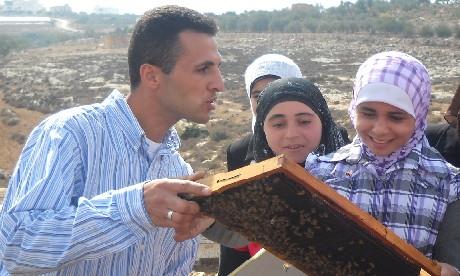Promoting rural employment for West Bank and Gaza Strip youths
Developing job opportunities and decent employment for youth are major challenges in the West Bank and Gaza Strip. The challenges are even greater for girls. FAO and its partners responded with a community-based initiative.

West Bank students learn about beekeeping [FAO/F. Dalla Valle]
Youth in the West Bank and Gaza Strip (WBGS) face numerous challenges to food security and their prospects for employment. Girls, in particular, face an uphill battle, as overall female participation in the labour market stands at only 15% - one of the lowest rates in the world.
Palestinian figures show 36 percent of 20-24 year olds and 39 percent of those aged 15-19 are jobless. Among youth, 46% of women aged 20-24 are unemployed. But schooling appears to have a positive impact. Women with at least 13 years of school have a jobless rate of 29% and men in this category have a jobless rate of 14%.
An FAO rural employment case study, Promoting employment and entrepreneurship for vulnerable youths in West Bank and Gaza Strip, prepared in collaboration with the Palestinian Authority and the United Nations Relief and Works Agency for Palestine Refugees in the Near East (UNRWA), looks at how a joint-agency initiative responded to challenges faced by youth in the WBGS. It also shows how the project helped to build the capacity of local women by reaching out to community groups.
Reaching youth through agriculture
The UN Food and Agriculture Organization (FAO), in collaboration with its partners, launched a Junior Farmer Field and Life Schools (JFFLS) programme in 2008. The JFFLS programme, previously successful in several African countries, took an innovative approach to empowering youth by teaching agricultural and business skills while placing a priority on raising self-esteem and building skills necessary for healthy, productive lives.
Agriculture is a source of work for an estimated 39 percent or more of those working in informal sectors in the WBGS, as well as an immediate source of household nutrition for many vulnerable families.
Using the agricultural growing calendar as the context, boys and girls learned the importance of sustainable farming practices and the environment. They also developed related life lessons like teamwork, setting goals, and recognizing the importance of personal space for growth. The youth were encouraged to use cultural activities to keep local traditions alive.
Many of the girls and boys (totalling 260 and 280 respectively) were chosen from rural or peripheral and poor farming families, as well as schools with a large proportion of students living in female-headed households. The schools provided a safe social space in which to address gender issues which may arise in connection with sexuality, health, protection from violence, property rights and other areas.
The JFFLS curriculum also addressed child protection, psycho-social support, nutrition, education and business skills. JFFLS students joined with local youth clubs to continue using and expanding their skills through partnerships with the Ministry of Education and Higher Education (MoEHE), the Ministry of Youth and Sport (MoYS) and Youth Development Association (YDA).
At the end of the 2008-2009 JFFLS pilot phase, students were able to identify crops, monitor plants for pests and protect against them. They also were able to set up mixed-vegetable gardens in environments with limited access to space or land. The JFFLS schools harvested the full variety of crops planted and either distributed the produce to participants or sold them to raise money for future development projects.
In Hebron, JFFLS graduates soon found a source of work with the practical knowledge acquired. Students who had been trained in beekeeping and honey processing were included in a beekeeping cooperative and soon began receiving a share of the cooperative’s profits.
The Ministry of Education and Higher Education reported that students involved in the 8-month JFFLS cycle had better year-end exam results overall than peers who were not enrolled in the JFFLS. Teachers also reported that in the 2008-2009 school year, the JFFLS was one of the most successful extra-curricular programmes.
Win-win link to women’s cooperatives
Among the employment challenges faced by many WBGS women are the lack of professional skills and the limited access to, and control over, productive resources such as land and water. The JFFLS youth initiative encouraged the active participation of local women while allowing them to benefit from training through the JFFLS.
Sixteen women’s cooperatives registered at the Ministry of Women’s Affairs (MoWA) and were in charge of preparing and distributing meals for the youth during the JFFLS lessons. They also received training in nutrition, food processing, marketing and other skills from extension workers trained by FAO.
Expanding on the idea
FAO increased the number of students involved in JFFLS and youth farmers’ associations in the 2009-2010 school year and extended the initiative to include Palestinian refugees in selected camps in the Gaza Strip, in collaboration with the United Nations Relief and Works Agency for Palestine Refugees in the Near East (UNRWA).
FAO and the ministries involved in the JFFLS initiative have discussed expansion of the programme to other rural and/or conflict-affected areas, as well as inclusion of agricultural activities in the national curriculum, in order to increase opportunities for local youth to become healthy, positive and productive young adults.
